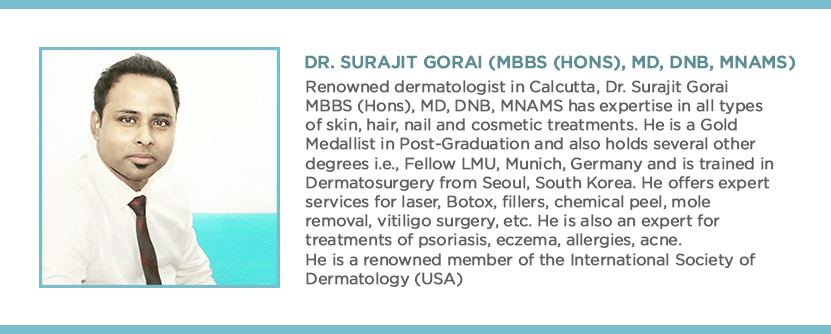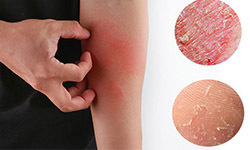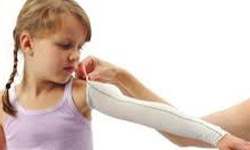Atopic Dermatitis or Eczema
is a skin condition that makes the skin red and itchy. It is mostly common in children but it can occur at any age. This skin condition is chronic, i.e. long lasting and can flare up periodically. There is a tendency of asthma or hay fever accompanying eczema. There is no permanent cure yet found for atopic dermatitis but there are treatments and preventive measures that can be taken to prevent further outbreaks and relieve your skin of the itch. Taking certain precautions such as avoiding use of harsh soaps, applying prescribed creams and ointments, and even moisturising your skin regularly helps in mellowing down atopic dermatitis. Below are certain signs and symptoms that you will notice in case of atopic dermatitis. Note that these can differ for every individual and hence there is no one yardstick to measure how damaging the skin condition is.
The Common Signs and Symptoms of Atopic Dermatitis or Eczema Include the Following:
- Dry skin
- Severe itching
- Swollen and sensitive skin due to scratching
- Scaly, cracked, thickened skin
- Red or brown patches on the wrists, hands, ankles, feet, neck and face, upper chest, and even the inner bend of elbows and knees, and sometimes the scalp (especially in infants)
- Pus seen as small bumps which could leak fluid
Atopic dermatitis or eczema mostly affects toddlers or pre-schoolers, before the age of 5 and could well persist into adolescence and even adulthood. For some, eczema is volatile in nature where it flares up one time and then clears up another time, and this cycle could continue for several years.
Seeking a Doctor’s Help is Important If you See Any of these Symptoms in Yourself or your Child.
- If the skin condition is affecting sleep and daily activities, making it uncomfortable.
- If there are signs of red streaks, yellow scabs or pus.
- If home remedies like moisturizer do not work and you still continue to experience the symptoms.
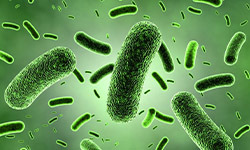
- Prevention
- Moisturising your skin with creams, lotions or ointments, twice a day, seals in the moisture and prevents further development of eczema. For yourself, choose a product that suits your skin the best. For your child, use a chemical-free petroleum jelly on the skin
- Usage of bland emollient without fragrances and colour is recommended like petroleum jelly, coconut oil or light liquid paraffin, etc.
- If you have eczema, your skin reacts differently to dust, stress, sweat, obesity, soaps, and pollen, and the exposure to these triggers will do more harm. So, prevent any triggers that could worsen the skin condition
- Food allergies are likely to be one of the main causes of eczema in infants and toddlers. Avoid giving your child foods like wheat, soy, eggs or milk, and consult your child’s doctor beforehand to identify any food allergies he or she may have
- Limit your shower to 10-15 minutes and use lukewarm water to bathe
- Avoid using harsh, chemical-based soaps on your body. Gentle, fragrance-free soaps are recommended for use as they do not strip your skin of its natural oils and moisture
- Use a soft towel to dry yourself and apply a moisturiser on your damp skin itself
- Treatment
- Medications
- The doctor may prescribe creams and ointments that will control the itching and also help in repairing the skin. Usually, a corticosteroid cream or ointment is prescribed but overuse can cause side effects that include thinning of skin. Remember to apply as directed by the doctor, after moisturising the affected skin. However, avoid stepping into direct sunlight when you are using these products
- Sometimes an antibiotic cream is prescribed to fight a bacterial infection, cracks and even open sores on the skin. In extreme cases, an oral antibiotic is also recommended for a short time to treat the infection
- Oral drugs are prescribed for the most severe cases to control inflammation and cannot be used long term since it could have potential side effects
- Therapies
- Severe atopic dermatitis can be treated with an intensive yet effective treatment of wet dressings. The affected area is wrapped with topical corticosteroids and wet bandages, and is usually done at the hospital since it requires nursing expertise to dress the widespread lesions across the skin. You can also ask the doctor how the bandaging can be done at home
- When topical treatments do not work and eczema flares up every now and then, light therapy is used. Phototherapy is the simplest form of light therapy where the skin is exposed to a controlled amount of natural sunlight. Artificial UVA and narrow band UVB treatments are also used for treatment either singularly or with medications
- Phototherapy or light-therapy is not used long-term as it can cause premature skin ageing or increase the risk of skin cancer as well. This is the main reason why phototherapy is not used to treat young children and infants. You can still consult the doctor to understand the advantages and the disadvantages of light therapy.
- Avoiding skin irritants and extreme temperatures
- Moisturising the infant’s skin with creams, ointments and bath oils
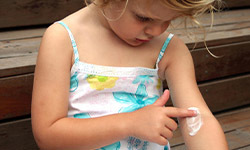
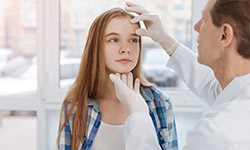
Infant Eczema
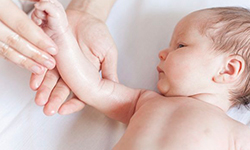
If the rash seems infected and these treatments do not have any positive effect on the skin, check with the doctor or dermatologist immediately. There is a chance a prescribed medicine or cream is what the baby needs to get the rash treated. To help with the itching and discomfort, especially at night-time, the doctor can prescribe an oral antihistamine that will lessen all the itching. Certain changes in your lifestyle and taking into account the precautionary measures listed above, you can manage to keep atopic dermatitis or eczema in check and prevent it from flaring. In case the treatment or preventive measures do not work in your case, get in touch with an expert dermatologist or skin doctor.
Author Bio


